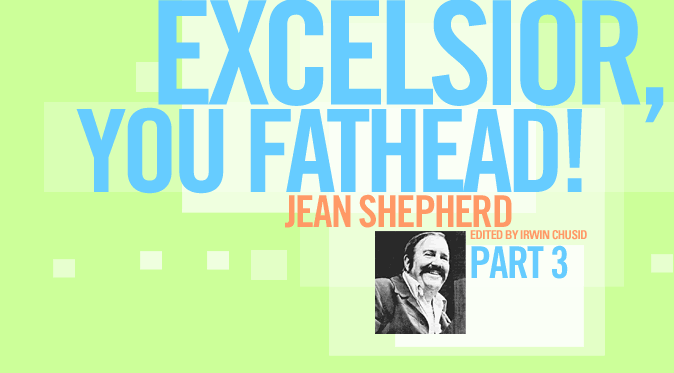


 |
 |
|
DAVE THE SPAZZ hosts chimpified radio on WFMU Thursday nights from 8-11 pm, and is a recovering Stooge-aholic. I first encountered Jean Shepherd in the early '70s after another grim night at Shea Stadium. Usually by the fifth inning, the Old Man knew in his bones that the game was over long before the pungent aroma of loss permeated the ballpark. As was our custom, me and my brother raced the Old Man to the parking lot to get a jump on homebound traffic. Sailing the Mercury Cougar at 90 mph onto an empty Whitestone Expressway was a slight compensation for another evening ill-spent. Even if the game sucked, at least we could beat those other losers back to their respective dens of defeat. Typically, we'd tune in the rest of the Mets Malaise on radio station WOR for the ride home. But one night was different. We must have left near the end of the fiasco, because the Old Man punched up the Jean Shepherd Show on the car radio - and my life was forever changed. Who the hell was this guy on WOR recounting intimate experiences that somehow linked a 1938 Hupmobile to a plate of French toast? Why was he gabbing on ceaselessly about illegal gypsy tollbooths and Morty the tuxedo rental guy from Al's Swank Formalwear? What motivated a grown man to kazoo and sing along with "The Bear Missed the Train" and "The Sheik Of Araby"? My brain did flip-flops in the back seat and I recognized that I was onto something big. As I listened to Shep yammer on, it dawned on me that there really was a world out there! And it was as routine and moronic as I imagined it to be! Was I aware of what a great storyteller he was? Or how his effortless segues bordered on the surreal? Or how he made the exotic mundane and vice versa on a five-night-a-week basis? Not likely. I just knew that he was funny as hell and that I was hooked. The classic days of radio were long dead by the time I started listening to Shepherd. That mattered little to me as I glued my eleven-year-old ear to the speaker that night in the back of the rattling Cougar. I made a pact with myself never to miss another episode of the Jean Shepherd Show. What Gangbusters and The Lone Ranger were to Shep, Shep was to me. MIKE "SPORT" MURPHY's album Willoughby was released on Kill Rock Stars Records in 1999. He lives on Long Island, and guest DJ'ed on Irwin's program in July 1999. "You've got to listen! Last night he did a play-by-play of the Christians versus the lions!" Yeah, yeah. Just to shut up Matthew Mignone - who ran up to me every day in the schoolyard of Brooklyn's Holy Name Elementary, babbling about his favorite radio show (RADIO show?) - I tuned to WOR to check out Jean Shepherd. Somewhere between the opening post-time fanfare and the closing theme's final chord (accompanied, as it would ever be, by a mysterious vocal noise that sounded like Shep not quite done yapping yet), the hook sank. Every night from then on, I camped under the blankets with my transistor savoring Shep's riffs on whatever came to mind: tales of Schwartz and Flick, analyses of "slob culture" and GI ribaldries... all chuckling forth from the ether in the conspiratorial voice of some hepcat uncle. He'd begin on some seemingly banal topic, then wander off-point with a slew of "by the way's" and "incidentally's," always returning for the perfect wrap-up just as that damn galloping music crescendoed up behind him. It was electrifying... as if Ken Nordine were channeling Mark Twain. I even relished the nights when Shep seemed uninterested in weaving his verbal tapestries, content to spin ridiculous old time records and twang his jew's harp. Almost alone among my childhood heroes, Shep held my attention through adulthood, and a possible reason may be gleaned from Shep's introduction to the published script of his outstanding 1976 PBS film The Phantom of the Open Hearth, a distillation of several sorta-autobiographical stories of young Ralph. James Broderick, the actor playing Ralph's father, was not quite nailing the subtext of a scene in which he slips the kid a 20 spot before the junior prom. Broderick figured the exchange was meant to convey the thorny Old Man's inner tenderness, but Shepherd took him aside and asked him to imagine what this family would be like two years after this scene. "I suppose Ralph goes in the Army or something, and the Old Man gets older, and maybe more unhappy," Broderick offered. Naw. Shep hit him with: "One year, almost to the day of Ralph's prom, in fact the week of Ralph's high school graduation, the Old Man comes home, announces he's leaving the family, and takes off for Palm Beach with a twenty-year-old stenographer with long blond hair and a Ford convertible. They never hear from him again." The stunned actor then played the scene flawlessly. (Subsequent portrayals of the Old Man - by good actors like Darren McGavin and James B. Sikking, who never received Jean's corrosive coaching - were lovably gruff and bumbling. Which is why A Christmas Story has become a holiday perennial, while The Phantom is a forgotten work of genius.) Well aware of this heart of darkness in his work, I was a bit less surprised than others in the audience at a live Shep appearance almost fifteen years later. To a packed school auditorium on Long Island, an aging and brittle Jean Shepherd brutally tore down all vestiges of the hepcat uncle, spitting venom at fans who mentioned his radio work and departing the post-show coffee-n-cake reception with a curt "Let's get the fuck out of here." I was full of whiskey, and found the incident grimly hilarious... but these poor schmoes - to whom Flick and the gang were treasured, lifelong friends - left heartbroken. Ralph had become the Old Man! As bitter a twist as any in Shep's work: I'M THE BLIND DATE! It kinda made me love him more, because despite such unforgivable callousness, there was a purity to his bile that again brought Twain to mind: "The secret source of Humor itself is not joy but sorrow. There is no humor in heaven." If the Twain comparison seems pretentious, let me compound the sin by asserting that Shep's best work in the medium he mastered (radio, contrary to his own fervent protests) stands alongside that of H.L. Mencken, Preston Sturges, Ernie Kovacs and Lenny Bruce in theirs - sawtooth-sharp, and All-American as the roller derby. Shep made school nights tolerable for countless young wise-asses. He persuaded John Cassavetes to make Shadows. He brought virtuoso, complex wit to pages, stages, and screens. He imbued his radio broadcasts with a bone-deep cynicism, mile-wide warmth, and raging intelligence unfathomable to devotees of, say, Howard Stern's easy crassness or (Shepherd imitator) Garrison Keillor's hokum. Shepherd taught many of us to recognize the exact pitch of laughter that would save our sanity here in Hell. BRUCE LONGSTREET was station manager of WFMU from 1974-1975 and 1981-1985. He hosted a free-form show here from 1972 to 1985. He has lived in California since 1996, and currently spends his evenings glowering at the radio. Shepherd sang the song of the Great American Non-Existent. Hordes of reasonably ambitious and industrious lower middle-class and middle-middle class folks with more or less conservative sensibilities that were bugged because life's vicissitudes had decreed that they were never going to be a Mickey Mantle, a Mahatma Gandhi, or a Harpo Marx. Or for that matter, Rita Hayworth, Joan Baez, or Shirley Chisholm. We were just going to be, well, us, and how do we come to grips with that? I imagine he was terrified of those battalions of pimply-faced 14-year-olds with transistor radios under their pillows, catching his live act broadcast from NYC's Limelight café after midnight on Saturday. These kids imagined him as some sort of leader, when he probably just wanted to be a guy on the radio. I was among that mob of adolescent disciples. There were a half dozen of us Shepherd cognoscenti at Alexander Hamilton Junior High in Elizabeth, New Jersey. For a while I was saddled with the nickname "Flick" after my frequent, furtive scrawlings of "Flick Lives!" on classroom blackboards. The moniker embarrassed the hell out of me. That wasn't the point. The point is that Shepherd represented the first hip grownup most of us encountered. He knew jazz. He knew baseball. He knew radio. He knew Shel Silverstein and S.J. Perelman. And he hadn't suppressed the memory of the agony of adolescence. He might be the only artist whose voiceover on a TV beer commercial brought delight instead of contemptuous sneers of "Sell-out!" I recall a Rheingold spot which played often during Mets games. Shep was always straightforward, and really leaned into it. A professional job. His attitude came through as if to challenge us civilians with, "I'm a radio guy, I'm an actor, I'm a performer, and this is how people like me make a living. Got a problem with that? Besides, haven't I already taught you not to pay attention to beer commercials?" Shepherd has left us here to soldier on gamely, but mostly without effect. Some days you win, some days you lose, some days you get rained out, but you've gotta suit up. We're all Bucky Dent wanting to be Ozzie Smith and we ain't gonna make it and we know it. So we gotta figure out a comfortable way to run out three score years and ten with that knowledge. Excelsior, You Fatheads! |
|
|
| © 2000 WFMU. All rights reserved. |